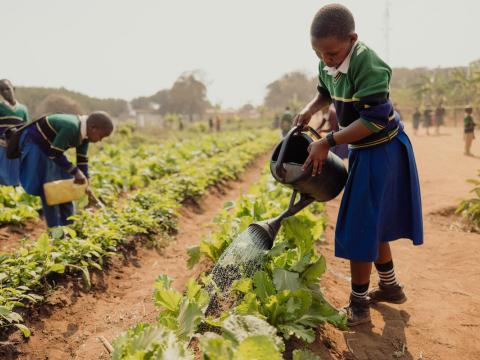Africa Day for Food and Nutrition: Strengthening Food Systems for Nutrition Security

World Vision, through the German Federal Ministry for Economic Cooperation and Development (BMZ) -funded Grow ENRICH Project and in partnership with Intergovernmental Authority on Development (IGAD) and other regional actors, reaffirms its commitment to improving food and nutrition security across East Africa. The Food Flow Landscape Assessment conducted in Kenya, Tanzania, and Somalia (Puntland) has offered valuable insights into food systems and their effects on vulnerable populations. These findings have informed targeted interventions that address both immediate nutritional needs and long-term systemic reforms.
This is especially paramount with millions across East Africa continuing to face the daily reality of food insecurity and malnutrition. In Kenya, Tanzania, and Somalia, stunting affects up to 32.9% of children under five, while wasting rates reach as high as 14% in some regions.[1] These figures reflect systemic challenges in food production, distribution, and access, compounded by climate shocks, displacement, and limited health infrastructure. As we mark Africa Day for Food and Nutrition Security, it is imperative to recognize the urgency of transforming food systems to be more inclusive, resilient, and nutrition-sensitive.
The Grow ENRICH Project has advanced food system resilience and nutrition outcomes across Kenya, Tanzania, and Somalia through a multi-sectoral approach. Its efforts have strengthened health systems by equipping 83 facilities with essential supplies and training 159 community health workers and 290 promoters in maternal and child nutrition.
Nutrition education has reached over 56,000 individuals through community outreach, while more than 36,000 pregnant and lactating women and children under five were referred for vital services. Agricultural development has been promoted through the training of 1,356 lead farmers in Good Agricultural Practices, benefiting over 5,000 households with improved seed access and sweet potato crops.[2]
Community empowerment has also been central, through models like Positive Deviance Hearth helping families adopt better feeding practices. Epitomising this, is one such example: Neema from Tanzania’s Shinyanga District, a farmer and mother, joined a Village Savings and Loan Association (VSLA) supported by the project. With her savings, she invested in seeds and began growing vegetables that now feed her family and generate income at the local market. Her household’s diet has diversified, and her children now consume vegetables daily.[3]This just one of the many outcomes that reflects the project’s emphasis on sustainable, community-led agricultural transformation.
Key Recommendations from the BMZ Grow ENRICH Project and Food Flow Assessment
- Strengthen Regional Food System Governance
- Establish multi-sectoral platforms to coordinate food system actions across borders.
- Promote consistent policies that support nutrition-sensitive agriculture and trade.
- Enhance Local Food Production and Market Access
- Support smallholder farmers, especially women and youth, with inputs, training, and market access.
- Invest in climate-smart agriculture and resilient food production systems.
- Improve Food Flow Infrastructure and Logistics
- Upgrade transport corridors and storage facilities to reduce post-harvest losses.
- Facilitate cross-border trade by addressing bottlenecks and regulatory barriers.
- Promote Nutrition-Sensitive Programming
- Integrate nutrition goals into agricultural and food security programs.
- Expand best practices in community-based nutrition efforts and behavior change communication.
- Leverage Data and Technology
- Use data to monitor food flows, reduce waste, and improve decision-making for nutrition-sensitive programs.
- Institutionalise food flow mapping and analysis to guide policy and programming decisions.
- Strengthen national and regional data systems for tracking food availability, access, and usage.
- Foster Inclusive Policy Dialogues and Implementation
- Involve civil society, the private sector, and voices from communities and children in shaping food system reforms.
- Ensure that policies meet the needs of marginalized groups, including pastoralists and displaced populations.
- Integrate nutrition into national development plans, agriculture investment strategies, and climate adaptation programs.
- Financing and Innovation
- Coordinate resource mobilisation efforts, including domestic financing, international donor involvement, and other innovative mechanisms.[4]
Call to Action : As we observe Africa Day for Food and Nutrition Security, World Vision calls on regional bodies, governments, and development partners to embrace these recommendations and take collective action. Now is the time to create resilient, inclusive, and nutrition-sensitive food systems that do not leave anyone behind.
[1] World Vision Somalia (2025). Grow ENRICH Somalia Baseline Report
[2] World Vision (2025). BMZ Grow ENRICH Project Factsheet – Global Summary.
[3]World Vision Tanzania (2025). ENRICH Project Profile
[4] World Vision (2025). Food Flow Landscape Assessment - Kenya, Tanzania, Somalia.